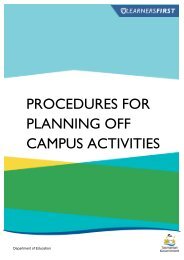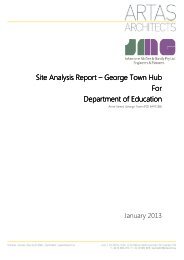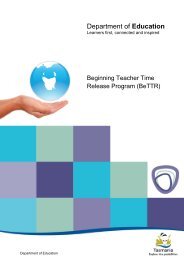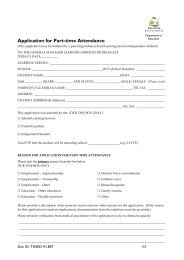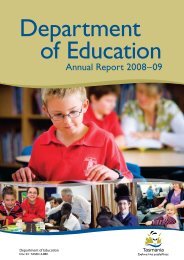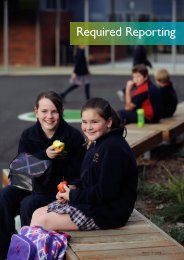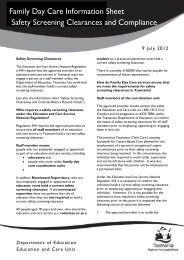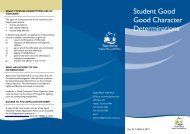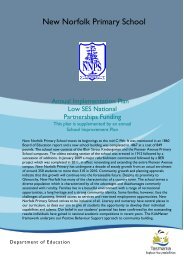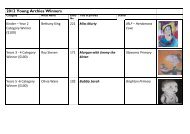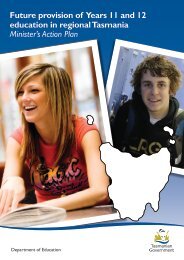Education
DoE Annual Report 2012-2013 - Department of Education
DoE Annual Report 2012-2013 - Department of Education
- No tags were found...
Create successful ePaper yourself
Turn your PDF publications into a flip-book with our unique Google optimized e-Paper software.
Literacy<br />
services<br />
A key strategy of the Tasmanian Adult Literacy Action Plan<br />
2010–2015 is the establishment of a statewide network<br />
of literacy coordinators and trained volunteer literacy<br />
tutors. In 2012–13, LINC Tasmania’s literacy coordinator<br />
network saw 23 coordinators and more than 600 trained<br />
volunteers assisting many hundreds of Tasmanians with low<br />
literacy skills.<br />
Literacy coordinators and volunteers are located in urban<br />
and regional communities across Tasmania including<br />
Bridgewater, Burnie, Deloraine, Devonport, George Town,<br />
Glenorchy, Hobart, Huonville, Kingston, Launceston,<br />
New Norfolk, Rosny, Scottsdale, Smithton, Sorell, St Helens<br />
and Queenstown. Three literacy coordinators work<br />
with the Department of Justice to support prisoners and<br />
offenders, with one coordinator based at Risdon Prison and<br />
two coordinators working with Community Corrections in<br />
Launceston and Hobart.<br />
LINC Tasmania literacy clients have diverse literacy learning<br />
needs and requirements and engage in a range of support<br />
services and programs, including one-to-one support,<br />
small group activities and skills development programs.<br />
Typically, adults seek literacy learning support through<br />
LINC Tasmania because they wish to develop their core<br />
skills (and confidence) in informal contexts that are relevant<br />
to their everyday lives – in order to improve their quality of<br />
life, their social connections and/or their capacity to access<br />
employment, education, and training opportunities.<br />
A large proportion of LINC Tasmania literacy clients (73%<br />
in 2012–13) have skill levels assessed at pre-level 1 (25%)<br />
or level 1 (48%) in one or more of the five core skills<br />
of reading, writing, numeracy, oral communication and<br />
learning. Many LINC Tasmania clients are also from culturally<br />
and linguistically diverse backgrounds, with limited literacy<br />
skills in their first language. A number of clients also have<br />
a learning disability. These client characteristics can make<br />
learner retention in literacy support services and programs<br />
problematic and pathways and transitions into employment,<br />
education and training difficult. They can also result in slow<br />
progress towards the achievement of learner goals and<br />
outcomes, and can pose significant challenges for a service<br />
network that relies largely on a volunteer workforce to<br />
achieve its performance targets.<br />
Successfully addressing the needs and requirements of<br />
literacy learners takes time, resources and innovative<br />
approaches. It requires a broad understanding and<br />
acceptance that there are no “quick fixes” and that some<br />
level of uncertainty around the solutions to the challenges<br />
of adult literacy, for individuals and their communities,<br />
is to be accepted.<br />
One of the emerging challenges associated with<br />
LINC Tasmania’s statewide provision of literacy services is<br />
that client engagement in regional areas lags considerably<br />
behind levels in urban centres. For example, in 2012–13<br />
LINC Tasmania urban services achieved, on average,<br />
81% of their performance targets, compared with 39% for<br />
services in regional areas. This variation supports existing<br />
evidence and research showing that adults with low level<br />
literacy skills living in regional and remote areas continue to<br />
experience significant barriers to literacy learning and are<br />
reluctant to seek support.<br />
Literacy Skills Development Program<br />
The LINC Tasmania Literacy Skills Development Program,<br />
part of the Tasmanian Adult Literacy Action Plan’s $1 million<br />
Investment Fund, provides $300,000 per annum to deliver<br />
practical and personal learning outcomes through learning<br />
strategies designed specifically for adults. Programs focus<br />
on building participants’ reading, writing, numeracy, oral<br />
communication and learning skills in particular contexts.<br />
Adult Literacy Coalition of Interest<br />
An Adult Literacy Coalition of Interest was established by<br />
the Minister for <strong>Education</strong> and Skills in 2011. Comprising<br />
business and community representatives, the coalition has<br />
been established to champion Tasmania’s Adult Literacy<br />
Network and oversee the implementation of the Action<br />
Plan. The Coalition assists in maximising the involvement<br />
of business and community sectors in the implementation<br />
of the Action Plan and actively promotes participation<br />
by community, business and government organisations in<br />
the network.<br />
Resource<br />
Description<br />
and Access<br />
implementation<br />
LINC Tasmania has started a process of enhancing<br />
records in its library catalogues through adoption of a new<br />
international standard – RDA (Resource Description and<br />
Access). RDA makes searching more intuitive and user<br />
friendly, and will allow for easier integration with records<br />
from other institutions such as museums and archives.<br />
In 2013, LINC Tasmania staff are conducting training<br />
sessions across the state for over 150 participants from<br />
schools, TasTAFE and LINC Tasmania, who are all partners<br />
in the TALIS catalogue.<br />
52 LINC Tasmania



